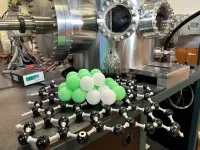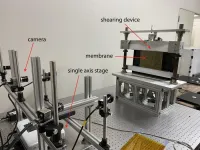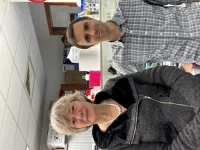(Press-News.org) EMBARGO 9.1.2025
New discovery makes organic solar cells more efficient and stable
Researchers at Åbo Akademi University in Finland have identified and eliminated a previously unknown loss mechanism in organic solar cells that makes them more efficient and gives them a longer lifetime. The results provide new insight into how efficiency and stability can be increased in the future.
The work of the Organic Electronics Research Group at Åbo Akademi University was carried out in cooperation with Professor Chang-Qi Ma's group at Suzhou Institute for Nano-Tech and Nano-Bionics. Members of the research team from Åbo Akademi University include Ronald Österbacka, Sebastian Wilken and Oskar Sandberg.
The study demonstrated an outstanding efficiency of over 18% in structure-inverted solar cells with a 1cm2 area. It also achieved the highest reported lifespan of organic solar cells to date, reaching 24,700 hours under white light illumination, which corresponds to a predicted operational life of more than 16 years.
Organic photovoltaics are interesting in terms of commercialisation because they are light, flexible and have an energy-efficient manufacturing process. The power conversion efficiency has increased dramatically over the last five years, with the best organic solar cells, which are based on a so-called conventional structure, reaching over 20% in the lab. However, the employed materials are susceptible to degradation when exposed to sunlight and air, and the long-term stability of these cells still requires improvements to make them widely available.
In terms of lifetime, it is beneficial that the topmost contact layer of the solar cell is made from the most durable material. These structure-inverted, or n-i-p solar cells, are a more stable option, although their power conversion efficiency still lags behind that of conventional designs. The researchers’ discovery shows a promising way to improve both the performance and stability of these structurally inverted organic solar cells.
The work identified a previously unknown loss mechanism in organic solar cells and a way to overcome it. The bottom contact of these devices, made from metal oxides such as zinc oxide, creates a narrow recombination area leading to a loss of photocurrent. By applying a thin, solvent-processed silicon oxide nitrate (SiOxNy) passivation layer on the bottom contact, the recombination area is eliminated, resulting in improved efficiency. The work underlines the potential for using the method in the large-scale production of efficient and stable organic solar cells.
The results have been published in the Nature Photonics journal and can be read in full here: https://www.nature.com/articles/s41566-024-01574-0
Enquiries:
Ronald Österbacka, Professor of Physics
Telephone: +358 50 409 6423
E-mail: ronald.osterbacka@abo.fi
END
New discovery makes organic solar cells more efficient and stable
2025-01-09
ELSE PRESS RELEASES FROM THIS DATE:
What we eat affects our health — and can alter how our genes function
2025-01-09
Fiber is well known to be an important part of a healthy diet, yet less than 10% of Americans eat the minimum recommended amount. A new study from Stanford Medicine might finally convince us to fill our plates with beans, nuts, cruciferous veggies, avocados and other fiber-rich foods. The research, which will be published in Nature Metabolism on Jan. 9 identified the direct epigenetic effects of two common byproducts of fiber digestion and found that some of the alterations in gene expression had anti-cancer actions.
When we eat fiber, the gut microbiome produces short-chain fatty ...
Lung cancer test predicts survival in early stages better than current methods
2025-01-09
ORACLE test predicts overall cancer survival independent of currently used clinical risk factors, and it has the best predictive power in stage 1 lung cancer.
A high ORACLE score is associated with a higher risk of cancer spread.
ORACLE could potentially be used to pick out patients who would benefit most from chemotherapy.
Researchers at the Francis Crick Institute, the UCL Cancer Institute and UCLH have shown that a test called ORACLE can predict lung cancer survival at the point of diagnosis better than currently used clinical risk factors. This could help doctors make more informed treatment decisions for people with stage ...
Pioneering new mathematical model could help protect privacy and ensure safer use of AI
2025-01-09
UNDER EMBARGO UNTIL 10 AM GMT / 5 AM ET THURSDAY 9 JANUARY 2025
Pioneering new mathematical model could help protect privacy and ensure safer use of AI
AI tools are increasingly being used to track and monitor us both online and in-person, yet their effectiveness comes with big risks. Computer scientists at the Oxford Internet Institute, Imperial College London, and UCLouvain have developed a new mathematical model which could help people better understand the risks posed by AI and assist regulators in protecting peoples’ privacy. The findings have been published today (9 January) in Nature Communications.
For ...
Floods, droughts, then fires: Hydroclimate whiplash is speeding up globally
2025-01-09
Key takeaways
Hydroclimate whiplash – rapid swings between intensely wet and dangerously dry weather – has already increased globally due to climate change, with further large increases expected as warming continues, according to a team of researchers led by UCLA’s Daniel Swain.
The “expanding atmospheric sponge,” or the atmosphere’s ability to evaporate, absorb and release 7% more water for every degree Celsius the planet warms, is a key driver of the whiplash.
Co-management of extreme rainfall or extreme droughts, ...
Scientists fuel sustainable future with catalyst for hydrogen from ammonia
2025-01-09
Scientists have created a catalyst for hydrogen generation from ammonia that becomes more active with time, and by counting atoms revealed changes that boost the catalyst’s performance.
A research team from the University of Nottingham's School of Chemistry, in collaboration with the University of Birmingham and Cardiff University, has developed a novel material consisting of nanosized ruthenium (Ru) clusters anchored on graphitized carbon. These Ru nanoclusters react with ammonia molecules, catalysing splitting ammonia into ...
Discovering hidden wrinkles in spacecraft membrane with a single camera
2025-01-09
Exiting Earth’s gravity takes an enormous amount of fuel and power. Due to this, spacecraft strapped to rockets are limited in their carry capacity and every gram must be accounted for. To lighten the load, thin membranes are being researched as alternative materials, but their plastic wrap property causes wrinkling that can affect operational performance. For this reason, there is a need to develop measurement technology that can accurately detect deformations.
Professor Takashi Iwasa at Osaka Metropolitan University’s Graduate School of Engineering led a team in developing a method for measuring the size of wrinkles ...
Women are less likely to get a lung transplant than men and they spend six weeks longer on the waiting list
2025-01-09
Women are less likely to receive a lung transplant and spend an average of six weeks longer on the waiting list, according to a study published today (Thursday) in ERJ Open Research [1]. However, women who receive a lung transplant are more likely than men to live for five years post-transplant. Based on their findings, the researchers encourage changes in regulation and clinical guidelines to address this inequality.
Lung transplantation is the only treatment for people with end-stage respiratory failure and patients on the waiting list have a high risk ...
Study sheds more light on life expectancy after a dementia diagnosis
2025-01-09
The average life expectancy of people diagnosed with dementia ranges from 9 years at age 60 to 4.5 years at age 85 for women and from 6.5 to just over 2 years, respectively, in men, finds a systematic review of the latest evidence in The BMJ today.
The results also suggest that one third of people with dementia are admitted to a nursing home within three years of diagnosis.
Nearly 10 million people worldwide receive a diagnosis of dementia every year, but survival estimates vary widely, and few ...
Tesco urged to drop an “unethical” in-store infant feeding advice service pilot
2025-01-09
UK supermarket giant Tesco is being urged to drop an “unethical” pilot of an in-store infant feeding advice service in which Danone-funded midwives are expected to wear branded uniforms and undergo training by the formula company, reveals an exclusive news report published by The BMJ today.
Critics say that the initiative, running in Tesco’s flagship store and set to be rolled out shortly, is a backward step and reminiscent of the “milk nurses” scandal of the 1970s, where formula industry salespeople dressed as nurses and promoted formula milk to parents.
One midwife hired by Danone quit ...
Unraveling the events leading to multiple sex chromosomes using an echidna genome sequence
2025-01-09
Unraveling the Events Leading to Multiple Sex Chromosomes Using an Echidna Genome Sequence
A nearly gapless genome sequence of the echidna, an egg-laying mammal with multiple sex chromosomes, helps researchers to track genomic reorganization events that gave rise to a highly unusual sex determination system.
The short-beaked echidna (Tachyglossus aculeatus) is one of Australia’s most iconic animals. Belonging to a unique group of mammals called “monotremes” (with the platypus as the other prominent member). Echidnas may at first glance be mistaken for a weird-looking hedgehog, ...



